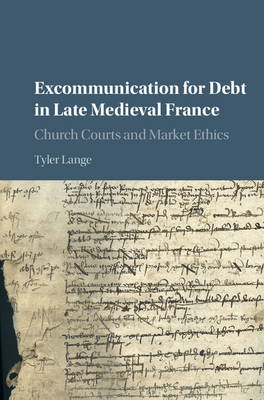
Excommunication for Debt in Late Medieval France
The Business of Salvation
Seiten
2016
Cambridge University Press (Verlag)
978-1-107-14579-5 (ISBN)
Cambridge University Press (Verlag)
978-1-107-14579-5 (ISBN)
Using quantitative and qualitative methods to re-evaluate the role of late medieval church courts, Tyler Lange examines the relatively common occurrence of excommunicated debtors. This reveals how day-to-day credit functioned in the late Middle Ages, what debt meant to contemporaries, and how believers understood the Church.
Late medieval church courts frequently excommunicated debtors at the request of their creditors. Tyler Lange analyzes over 11,000 excommunications between 1380 and 1530 in order to explore the forms, rhythms, and cultural significance of the practice. Three case studies demonstrate how excommunication for debt facilitated minor transactions in an age of scarce small-denomination coinage and how interest-free loans and sales credits could be viewed as encouraging the relations of charitable exchange that were supposed to exist between members of Christ's body. Lange also demonstrates how from 1500 or so believers gradually turned away from the practice and towards secular courts, at the same time as they retained the moralized, economically irrational conception of indebtedness we have yet to shake. The demand-driven rise and fall of excommunication for debt reveals how believers began to reshape the institutional Church well before Martin Luther posted his theses.
Late medieval church courts frequently excommunicated debtors at the request of their creditors. Tyler Lange analyzes over 11,000 excommunications between 1380 and 1530 in order to explore the forms, rhythms, and cultural significance of the practice. Three case studies demonstrate how excommunication for debt facilitated minor transactions in an age of scarce small-denomination coinage and how interest-free loans and sales credits could be viewed as encouraging the relations of charitable exchange that were supposed to exist between members of Christ's body. Lange also demonstrates how from 1500 or so believers gradually turned away from the practice and towards secular courts, at the same time as they retained the moralized, economically irrational conception of indebtedness we have yet to shake. The demand-driven rise and fall of excommunication for debt reveals how believers began to reshape the institutional Church well before Martin Luther posted his theses.
Tyler Lange is a historian of the late Middle Ages and the early modern period whose research centers on questions of legal, religious, and social practices between 1400 and 1600. His first book, The First French Reformation: Church Reform and the Origins of the Old Regime, appeared with Cambridge in 2014. He is a past fellow of the Alexander von Humboldt Foundation and presently a lecturer at the University of California, Berkeley.
Introduction; 1. Church courts and credit; 2. The supply of ecclesiastical justice; 3. Case studies: demand for ecclesiastical justice; 4. A crisis of credit? The Reformation and the early modern world; Conclusion: from church to market; Bibliography; Index.
| Erscheinungsdatum | 31.03.2016 |
|---|---|
| Zusatzinfo | 17 Tables, black and white; 1 Maps; 15 Line drawings, black and white |
| Verlagsort | Cambridge |
| Sprache | englisch |
| Maße | 160 x 235 mm |
| Gewicht | 610 g |
| Themenwelt | Geschichte ► Allgemeine Geschichte ► Mittelalter |
| Geisteswissenschaften ► Geschichte ► Regional- / Ländergeschichte | |
| Geschichte ► Teilgebiete der Geschichte ► Religionsgeschichte | |
| Religion / Theologie ► Christentum ► Kirchengeschichte | |
| ISBN-10 | 1-107-14579-1 / 1107145791 |
| ISBN-13 | 978-1-107-14579-5 / 9781107145795 |
| Zustand | Neuware |
| Informationen gemäß Produktsicherheitsverordnung (GPSR) | |
| Haben Sie eine Frage zum Produkt? |
Mehr entdecken
aus dem Bereich
aus dem Bereich
eine neue Geschichte des Mittelalters
Buch | Hardcover (2023)
C.H.Beck (Verlag)
38,00 €


